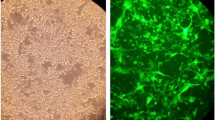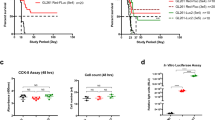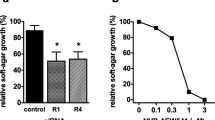Abstract
Malignant gliomas are the most common of primary brain tumors and have been proven incurable with conventional treatments. Evidence have shown that a recombinant adenoviral vector expressing human wild-type p53, granulocyte-macrophage colony-stimulating factor (GM-CSF), and B7-1 genes (BB-102) may have antitumor effects in vitro. In this study, we investigated the effects of BB-102-based vaccine on glioma in vivo. An animal model using nonobese diabetic/severe combined immunodeficiency (NOD/SCID) mice with human immune system was established. The mice were vaccinated with inactivated U251 glioma cells transduced with BB-102 or adenoviral vector expressing green fluorescence protein (Ad-GFP) as a control and followed by the challenge of live U251 glioma cells. Tumor growth and antitumor responses were measured. Data showed that mice vaccinated with BB-102 had significantly reduced local tumor growth compared to mice with Ad-GFP vaccination or the control group. Histopathological analysis displayed low tumor cell density and significant infiltration of human peripheral blood lymphocytes (HuPBLs) in the tumor tissues of mice transduced with BB-102. Immunohistochemical analysis showed that mutant p53 was not expressed in tumor tissues of mice with BB-102 vaccination, and the expression level of Ki67 was significantly lower in the tumor tissues of the BB-102 group than those in the Ad-GFP group or the control group. Further study demonstrated that mice with BB-102 vaccination had significantly increased total T cell numbers, total T cell proportion, CD4+ T cell proportion, and CD8+ T cell proportion in spleens, as well as higher value of IgG, IgA, and IgE in sera. These data suggest that the recombinant adenoviral vector expressing human wild-type p53, GM-CSF, and B7-1 genes could suppress glioma in NOD/SCID mice model and might be considered as a novel strategy for glioma therapy.




Similar content being viewed by others
References
Omuro A, DeAngelis LM. Glioblastoma and other malignant gliomas: a clinical review. JAMA. 2013;310:1842–50.
Wrensch M, Jenkins RB, Chang JS, Yeh RF, Xiao Y, Decker PA, et al. Variants in the CDKN2B and RTEL1 regions are associated with high-grade glioma susceptibility. Nat Genet. 2009;41:905–8.
Chen L. Co-inhibitory molecules of the B7-CD28 family in the control of T-cell immunity. Nat Rev Immunol. 2004;4:336–47.
Cridge BJ, Rosengren RJ. Critical appraisal of the potential use of cannabinoids in cancer management. Cancer Manag Res. 2013;5:301–13.
Hawkins DS, Demers GW, Galloway DA. Inactivation of p53 enhances sensitivity to multiple chemotherapeutic agents. Cancer Res. 1996;56:892–8.
Sloan AE, Dansey R, Zamorano L, Barger G, Hamm C, Diaz F, et al. Adoptive immunotherapy in patients with recurrent malignant glioma: preliminary results of using autologous whole-tumor vaccine plus granulocyte-macrophage colony-stimulating factor and adoptive transfer of anti-CD3-activated lymphocytes. Neurosurg Focus. 2000;9:e9.
Schultze J, Nadler LM, Gribben JG. B7-mediated costimulation and the immune response. Blood Rev. 1996;10:111–27.
Ren SP, Wu CT, Huang WR, Lu ZZ, Jia XX, Wang L, et al. Adenoviral-mediated transfer of human wild-type p53, GM-CSF and B7-1 genes results in growth suppression and autologous anti-tumor cytotoxicity of multiple myeloma cells in vitro. Cancer Immunol Immunother. 2006;55:375–85.
Shi M, Wang FS, Wu ZZ. Synergetic anticancer effect of combined quercetin and recombinant adenoviral vector expressing human wild-type p53, GM-CSF and B7-1 genes on hepatocellular carcinoma cells in vitro. World J Gastroenterol. 2003;9:73–8.
Qiu Z, Lao M, Wu C. Co-transfer of human wild-type p53 and granulocyte-macrophage colony-stimulating factor genes via recombinant adenovirus induces apoptosis and enhances immunogenicity in laryngeal cancer cells. Cancer Lett. 2001;167:25–32.
Pan D, Wei X, Liu M, Feng S, Tian X, Feng X, et al. Adenovirus mediated transfer of p53, GM-CSF and B7-1 suppresses growth and enhances immunogenicity of glioma cells. Neurol Res. 2010;32:502–9.
Parney IF, Petruk KC, Zhang C, Farr-Jones M, Sykes DB, Chang LJ. Granulocyte-macrophage colony-stimulating factor and B7-2 combination immunogene therapy in an allogeneic Hu-PBL-SCID/beige mouse-human glioblastoma multiforme model. Hum Gene Ther. 1997;8:1073–85.
Komata T, Tanaka R, Yamamoto K, Oda T, Ono K, Yoshida S, et al. B7-1(CD80)-transfected human glioma cells and interleukin-12 directly stimulate allogeneic CD8+ T cells. J Immunother. 1997;20:256–64.
Feuerer M, Beckhove P, Bai L, Solomayer EF, Bastert G, Diel IJ, et al. Therapy of human tumors in NOD/SCID mice with patient-derived reactivated memory T cells from bone marrow. Nat Med. 2001;7:452–8.
Walker W, Gallagher G. The development of a novel immunotherapy model of human ovarian cancer in human PBL-severe combined immunodeficient (SCID) mice. Clin Exp Immunol. 1995;101:494–501.
Fujii E, Suzuki M, Matsubara K, Watanabe M, Chen YJ, Adachi K, et al. Establishment and characterization of in vivo human tumor models in the NOD/SCID/gamma(c)(null) mouse. Pathol Int. 2008;58:559–67.
Kozłowska A, Mackiewicz J, Mackiewicz A. Therapeutic gene modified cell based cancer vaccines. Gene. 2013;525:200–7.
Kalinski P, Muthuswamy R, Urban J. Dendritic cells in cancer immunotherapy: vaccines and combination immunotherapies. Expert Rev Vaccines. 2013;12:285–95.
Conflicts of interest
None
Author information
Authors and Affiliations
Corresponding author
Additional information
Sizhe Feng and Song Han contributed equally to this work.
Rights and permissions
About this article
Cite this article
Feng, S., Han, S., Pan, D. et al. Recombinant adenoviral vector expressing human wild-type p53, GM-CSF, and B7-1 genes suppresses the growth of glioma in vivo. Tumor Biol. 35, 4411–4417 (2014). https://doi.org/10.1007/s13277-013-1580-7
Received:
Accepted:
Published:
Issue Date:
DOI: https://doi.org/10.1007/s13277-013-1580-7




